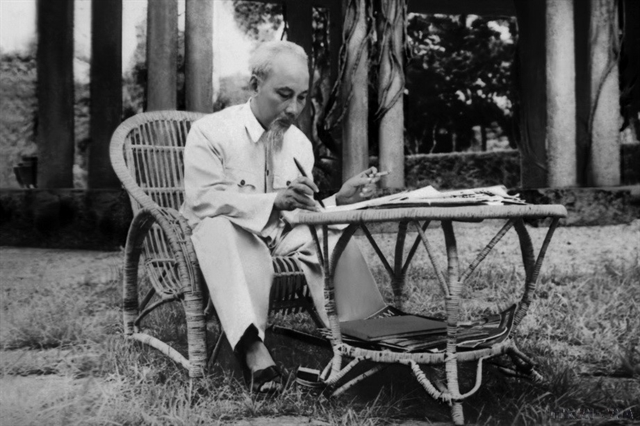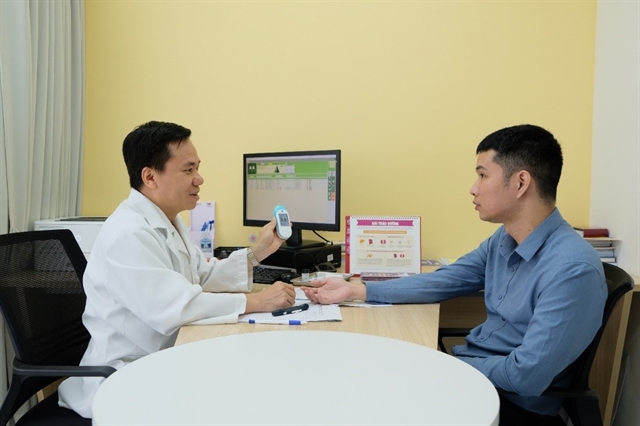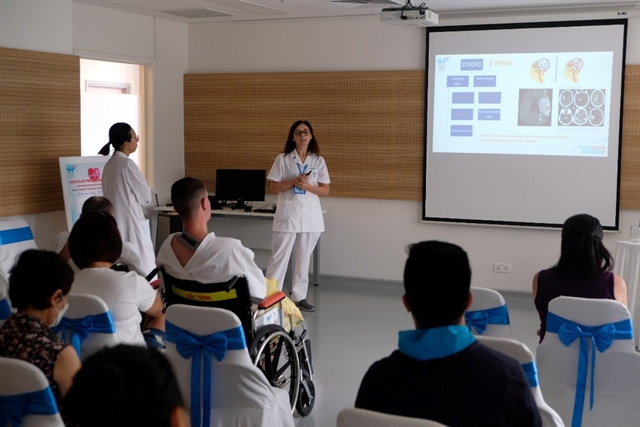 Society
Society

 |
| Doctor Nguyễn Văn Mùi examines a patient at the Hanoi French Hospital. — Photo courtesy of HFH |
HÀ NỘI — People who suffer a stroke can be left with serious complications, it can even be fatal, if they do not receive timely emergency treatment. However, health experts said that stroke can be prevented by changing key risk factors.
There are two types of stroke, including hemorrhagic stroke caused by a ruptured artery and ischemic stroke, caused by a blocked artery. If a patient has a stroke and they do not receive rapid emergency treatment, they can fall into a coma from which they may never recover.
Doctor Nguyễn Văn Mùi, an endocrinologist at the Hanoi French Hospital (HFH), said: "Stroke or cerebrovascular accident are dangerous complications and also the leading cause of death in people with diabetes. The risk of stroke in people with type 2 diabetes increases two to four times compared to normal people."
 |
| Dr. Sabrina Stefanizzi shares with patients and their family members how to prevent the risk of stroke. — Photo courtesy of HFH |
Dr. Sabrina Stefanizzi, Department of Neurology, coordinator of the Centre for Cardiovascular Disease Prevention at HFH said Việt Nam has a high stroke rate.
She suggested some measures to prevent stroke risk for the community, especially people at high risk such as people with high blood pressure, cardiovascular diseases and diabetes.
She said that stabilising blood pressure combined with maintaining a healthy diet, avoiding becoming overweight, reducing salt consumption and limiting stress can reduce the risk of stroke. If people have high blood pressure, they need to strictly follow their doctor's instructions on using blood pressure-balancing medications.
It is necessary to provide adequate nutrition for the body, supplementing a variety of green vegetables and fresh fruits to increase resistance. Limit the use of foods rich in saturated fat, fried foods and fast foods to control blood cholesterol because this is a factor that increases the risk of artery blockage, limiting blood circulation to the brain and increasing the risk of stroke, according to Stefanizzi.
Doctors also recommend that each person should build a healthy lifestyle, limit the use of stimulants, not drink alcohol or smoke and increase physical fitness and exercise to help keep their weight down, avoid becoming obese and minimise stroke risks. They also advise patients, especially those with a history of heart disease or blood pressure, to use medication regularly as prescribed by their doctor.
Experts also recommend people visit hospitals for general health checks and stroke screening to detect risk factors early, thereby taking effective prevention measures. On average everyone should have a general health check-up once every six months to one year.
To help the community improve its understanding of stroke, prevention, recognition and treatment of stroke, the Hanoi French Hospital will organise a seminar, entitled 'Stroke: From risk prevention to timely emergency treatment', on June 15.
With the guidance of experienced doctors and experts from France and Việt Nam, the event is not only for those at high risk of stroke but also for caregivers and everyone concerned about their health.
At the event, attendees will be screened for risk factors and receive personal consultation with experts, to maintain good health and avoid the risk of stroke, especially during the peak heat season. The event is completely free but you do need to pre-register via the hotline 024-35771100. — VNS




